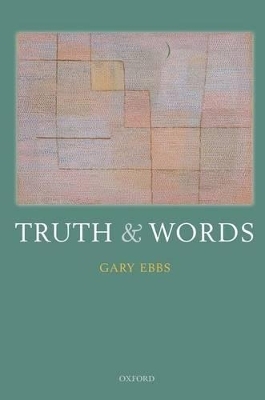
Truth and Words
Oxford University Press (Verlag)
978-0-19-969226-2 (ISBN)
To clarify and facilitate our inquiries we need to define a disquotational truth predicate that we are directly licensed to apply not only to our own sentences as we use them now, but also to other speakers' sentences and our own sentences as we used them in the past. The conventional wisdom is that there can be no such truth predicate. For it appears that the only instances of the disquotational pattern that we are directly licensed to accept are those that define 'is true' for our own sentences as we use them now. Gary Ebbs shows that this appearance is illusory. He constructs an account of words that licenses us to rely not only on formal (spelling-based) identifications of our own words, but also on our non-deliberative practical identifications of other speakers' words and of our own words as we used them in the past. To overturn the conventional wisdom about disquotational truth, Ebbs argues, we need only combine this account of words with our disquotational definitions of truth for sentences as we use them now. The result radically transforms our understanding of truth and related topics, including anti-individualism, self-knowledge, and the intersubjectivity of logic.
Gary Ebbs is Professor of Philosophy at Indiana University, Bloomington, and has previously held faculty positions at University of Illinois, Urbana, University of Pennsylvania, and Harvard University. He is the author of Rule-Following and Realism (Harvard Press, 1997), and has published a number of articles on such topics as sameness of reference between speakers and across time, learning from others by trusting what they say, the compatibility of anti-individualism with self-knowledge, Hilary Putnam's views of truth and reference, and W. V. Quine's and Rudolf Carnap's debate about analyticity and truth by convention.
Introduction ; 1. Regimentation ; 2. The Tarski-Quine thesis ; 3. The intersubjectivity constraint ; 4. How to think about words ; 5. Learning from others, interpretation, and charity ; 6. A puzzle about sameness of satisfaction across time ; 7. Sense and partial extension ; 8. The puzzle diagnosed and dissolved ; 9. Applications and consequences
| Erscheint lt. Verlag | 14.4.2011 |
|---|---|
| Verlagsort | Oxford |
| Sprache | englisch |
| Maße | 156 x 235 mm |
| Gewicht | 498 g |
| Themenwelt | Geisteswissenschaften ► Philosophie ► Logik |
| Geisteswissenschaften ► Philosophie ► Sprachphilosophie | |
| Geisteswissenschaften ► Sprach- / Literaturwissenschaft ► Sprachwissenschaft | |
| ISBN-10 | 0-19-969226-2 / 0199692262 |
| ISBN-13 | 978-0-19-969226-2 / 9780199692262 |
| Zustand | Neuware |
| Haben Sie eine Frage zum Produkt? |
aus dem Bereich


